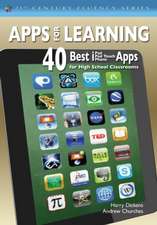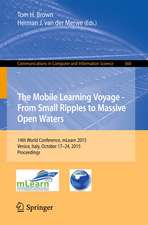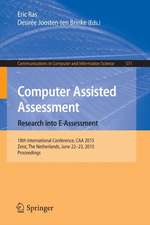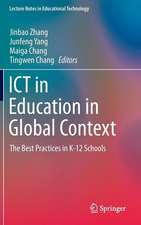Mobile Learning Design: Theories and Application: Lecture Notes in Educational Technology
Editat de Daniel Churchill, Jie Lu, Thomas K.F. Chiu, Bob Foxen Limba Engleză Hardback – 22 dec 2015
| Toate formatele și edițiile | Preț | Express |
|---|---|---|
| Paperback (1) | 579.72 lei 38-45 zile | |
| Springer Nature Singapore – 30 mar 2019 | 579.72 lei 38-45 zile | |
| Hardback (1) | 597.44 lei 38-45 zile | |
| Springer Nature Singapore – 22 dec 2015 | 597.44 lei 38-45 zile |
Din seria Lecture Notes in Educational Technology
-
 Preț: 349.91 lei
Preț: 349.91 lei -
 Preț: 359.75 lei
Preț: 359.75 lei -
 Preț: 397.97 lei
Preț: 397.97 lei - 18%
 Preț: 898.43 lei
Preț: 898.43 lei - 20%
 Preț: 1006.05 lei
Preț: 1006.05 lei - 20%
 Preț: 820.58 lei
Preț: 820.58 lei - 15%
 Preț: 647.27 lei
Preț: 647.27 lei - 15%
 Preț: 699.45 lei
Preț: 699.45 lei - 15%
 Preț: 633.31 lei
Preț: 633.31 lei - 18%
 Preț: 945.62 lei
Preț: 945.62 lei - 20%
 Preț: 580.52 lei
Preț: 580.52 lei - 15%
 Preț: 702.16 lei
Preț: 702.16 lei - 15%
 Preț: 644.82 lei
Preț: 644.82 lei - 15%
 Preț: 650.69 lei
Preț: 650.69 lei - 24%
 Preț: 804.32 lei
Preț: 804.32 lei - 18%
 Preț: 1003.38 lei
Preț: 1003.38 lei - 15%
 Preț: 647.08 lei
Preț: 647.08 lei - 18%
 Preț: 947.85 lei
Preț: 947.85 lei - 15%
 Preț: 643.48 lei
Preț: 643.48 lei - 18%
 Preț: 999.45 lei
Preț: 999.45 lei - 18%
 Preț: 1102.03 lei
Preț: 1102.03 lei - 18%
 Preț: 891.80 lei
Preț: 891.80 lei - 18%
 Preț: 1002.94 lei
Preț: 1002.94 lei -
 Preț: 393.90 lei
Preț: 393.90 lei - 18%
 Preț: 790.77 lei
Preț: 790.77 lei - 18%
 Preț: 946.41 lei
Preț: 946.41 lei - 18%
 Preț: 784.92 lei
Preț: 784.92 lei - 15%
 Preț: 643.99 lei
Preț: 643.99 lei - 15%
 Preț: 643.00 lei
Preț: 643.00 lei - 15%
 Preț: 644.63 lei
Preț: 644.63 lei - 24%
 Preț: 818.22 lei
Preț: 818.22 lei - 18%
 Preț: 902.36 lei
Preț: 902.36 lei - 18%
 Preț: 952.72 lei
Preț: 952.72 lei - 18%
 Preț: 942.44 lei
Preț: 942.44 lei -
 Preț: 387.96 lei
Preț: 387.96 lei - 18%
 Preț: 1001.50 lei
Preț: 1001.50 lei - 15%
 Preț: 647.59 lei
Preț: 647.59 lei - 15%
 Preț: 642.83 lei
Preț: 642.83 lei
Preț: 597.44 lei
Preț vechi: 746.80 lei
-20% Nou
Puncte Express: 896
Preț estimativ în valută:
114.32€ • 119.36$ • 94.61£
114.32€ • 119.36$ • 94.61£
Carte tipărită la comandă
Livrare economică 31 martie-07 aprilie
Preluare comenzi: 021 569.72.76
Specificații
ISBN-13: 9789811000256
ISBN-10: 9811000255
Pagini: 429
Ilustrații: XVIII, 431 p. 67 illus., 28 illus. in color.
Dimensiuni: 155 x 235 x 30 mm
Greutate: 1.01 kg
Ediția:1st ed. 2016
Editura: Springer Nature Singapore
Colecția Springer
Seria Lecture Notes in Educational Technology
Locul publicării:Singapore, Singapore
ISBN-10: 9811000255
Pagini: 429
Ilustrații: XVIII, 431 p. 67 illus., 28 illus. in color.
Dimensiuni: 155 x 235 x 30 mm
Greutate: 1.01 kg
Ediția:1st ed. 2016
Editura: Springer Nature Singapore
Colecția Springer
Seria Lecture Notes in Educational Technology
Locul publicării:Singapore, Singapore
Public țintă
ResearchCuprins
FOREWORD.- PREFACE Mobile Learning Design: Theories and Applications.- PART 1: Mobile Learning Design.- 1.Framework for Designing Mobile Learning Environments.- 2. Conceptualising Authentic Mobile Learning.- 3.Mobile Social Media: Redefining Professional Development and Collaborative Scholarship.- 4.Interactivity and Mobile Technologies: An Activity Theory Perspective.- 5.Educational Apps Ontology
.- 6.Augmented Learning with Augmented Reality.- PART 2: Mobile Learning Adoption and Student Perception.- 7.Mobile Technology and Interactive Lectures: The Key Adoption Factors.- 8.Bangladesh University Student Conceptions of M-learning.- 9.Mobile Learning and Student Concerns and Attitudes.- 10.Access Moodle Using Mobile Phones: Student Usage and Perceptions.- PART 3: Mobile Learning Analytics.- 11.An Effective Cloud-based Simulator Facilitating Learning Analytics on Mobile Devices.- 12.A New Wave of Innovation Using Mobile Learning Analytics for Flipped Classroom.- PART 4: Mobile Learning Across Curriculum.- 13.Mobile Learning in K-12 Education: Personal Meets Systemic.- 14.Overcoming Teachers’ Concerns -- Where are We in the Harnessing of Mobile Technology in K-12 Classrooms in Hong Kong.- 15.Exploring the Suitability for Early Childhood Education.- 16.Text Messaging for Out-of-Class Communication: Impact on Immediacy and Affective Learning.- 17.Implementing a Mobile App as a Personal Learning Environment for Workplace Learners.- PART 5: Mobile Learning in Subject Domains.- 18.The Theory of Context-aware Ubiquitous Learning and the Affordances of This Approach for Geometry Learners.- 19.Three Phases of Mobile Learning State-of-the-Art and Case of Mobile Help Seeking Tool for the Healthcare Sector.- 20.Mobile-assisted Language Learning in China’s College English Education: The Reality and Research.- 21.Enacting App-based Learning Activities with Viewing and Representing Skills in Preschool Mathematics Lessons.- 22.Effects of Prior Knowledge on Mathematics Different Order Thinking Skills in Mobile Multimedia Environments.- 23.An Investigation of the Effects of Individual Differences on Mobile-based Augmented Reality English Vocabulary Learning.- PART 6: Future Developments.- 24.Future Directions in Mobile Learning.- About the Editors and the Authors.
Textul de pe ultima copertă
This book focuses on mobile learning design from both theoretical and practical perspectives. It introduces and discusses how mobile learning can be effectively integrated into curricula, highlighting the design of four key components of learning-centric pedagogy: Resource, Activity, Support and Evaluation in the context of mobile learning. It also investigates the learning theories underpinning mobile learning design, and includes case studies in different contexts. It provides practical insights that allow teachers to change and transform teaching practices using mobile technology. Anyone involved in mobile-technology enhanced learning and teaching will find this book both informative and useful.
Caracteristici
Discusses mobile learning design from a learning-centric perspective Provides practical information for teachers as well as theory and models for further research into mobile learning for researchers Explores four key components of learning-centric pedagogical design mediated by mobile technology Focuses on both theory and applications Includes supplementary material: sn.pub/extras

























